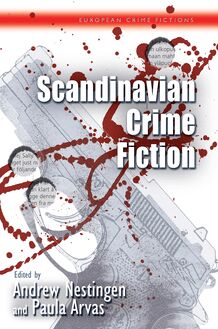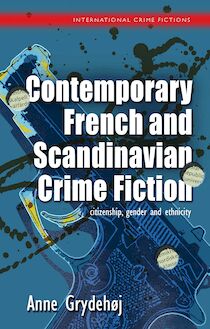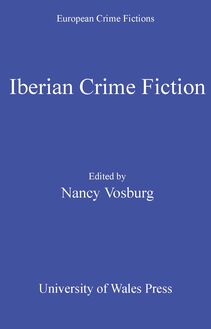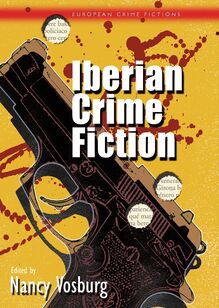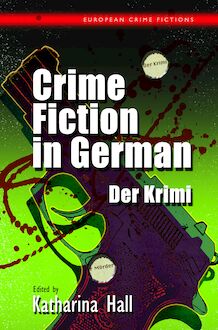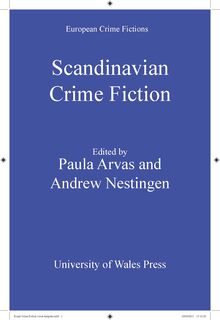Italian Crime Fiction , livre ebook
118
pages
English
Ebooks
2011
Vous pourrez modifier la taille du texte de cet ouvrage
Obtenez un accès à la bibliothèque pour le consulter en ligne En savoir plus
Découvre YouScribe en t'inscrivant gratuitement
Découvre YouScribe en t'inscrivant gratuitement
118
pages
English
Ebooks
2011
Vous pourrez modifier la taille du texte de cet ouvrage
Obtenez un accès à la bibliothèque pour le consulter en ligne En savoir plus
Publié par
Date de parution
15 octobre 2011
Nombre de lectures
1
EAN13
9781783164813
Langue
English
Iberian Crime Fiction is the first volume in English to provide an extensive overview of crime fiction in Spain and Portugal. While the origins of peninsular crime fiction are traced in Nancy Vosburg's introductory chapter to the volume, the essays focus on specific topics that provide readers with a sense of the development of the genre in the second half of the 20th-century and current trends in the 21st-century. Patty Hart, whose The Spanish Sleuth introduced English-speaking readers to early crime fiction in Spain, provides a summary account of the development of the crime novel from the 1950s through the 1980s, highlighting the major authors and works that set the stage for the boom that followed the establishment of the novela negra tradition in the 1970s. This tradition, spearheaded by Manuel Vazquez Montalban, is the subject of a separate essay by Maria Balibrea that analyzes the socio-political conditions that gave rise to the novela negra. NancyVosburg studies the emergence of a feminine/feminist crime novel in the 1980s and 1990s and the subversion of masculine codes associated with crime fiction, while Stewart King analyzes crime fiction from the Catalan, Basque, and Galician autonomous regions of Spain, focusing on the political realities that resulted in a different use of the genre as a vehicle of regional nationalism. David Knutson traces contemporary trends in Spanish crime fiction, beginning in the 1990s and up to the present. Paul Castro's essay documents the emergence of crime fiction in Portugal and the major works/authors through to the present.
Publié par
Date de parution
15 octobre 2011
Nombre de lectures
1
EAN13
9781783164813
Langue
English
Series Editors Claire Gorrara (Cardiff University) Shelley Godsland (University of Birmingham) Giuliana Pieri (Royal Holloway, London)
Editorial Board Margaret Atack (University of Leeds) George Demko (Dartmouth College) John Foot (University College London) Stephen Knight (Cardiff University) Nickianne Moody (Liverpool John Moores University) Elfriede Müller (Berlin) Anne White (University of Bradford)
EUROPEAN CRIME FICTIONS
ITALIAN CRIME FICTION
Edited by
Giuliana Pieri
© The Contributors, 2011 Reprinted, 2013 and 2015
All rights reserved. No part of this book may be reproduced in any material form (including photocopying or storing it in any medium by electronic means and whether or not transiently or incidentally to some other use of this publication) without the written permission of the copyright owner except in accordance with the provisions of the Copyright, Designs and Patents Act 1988. Applications for the copyright owner’s written permission to reproduce any part of this publication should be addressed to the University of Wales Press, 10 Columbus Walk, Brigantine Place, Cardiff CF10 4UP.
www.uwp.co.uk
British Library Cataloguing-in-Publication Data A catalogue record for this book is available from the British Library. ISBN 978-0-7083-2431-8 (hardback) 978-0-7083-2432-5 (paperback) e-ISBN 978-1-78316-481-3
The right of the Contributors to be identified separately as authors of their contributions has been asserted by them in accordance with sections 77 and 79 of the Copyright, Designs and Patents Act 1988.
Cover design: Olwen Fowler Cover illustration: Brett Breckon.
Contents
Acknowledgements
Notes on Contributors
1 Introduction
Giuliana Pieri
2 The Emergence of a New Literary Genre in Interwar Italy
Jane Dunnett
3 Founding Fathers: Giorgio Scerbanenco
Jennifer Burns
4 Literature and the Giallo: Gadda, Eco, Tabucchi and Sciascia
Joseph Farrell
5 The Mysteries of Bologna: On Some Trends of the Contemporary Giallo
Luca Somigli
6 Crime and the South
Mark Chu
7 Italian Women Crime Writers
Giuliana Pieri and Lucia Rinaldi
8 Milano nera: Representing and Imagining Milan in Italian Noir and Crime Fiction
Giuliana Pieri
9 Annotated Bibliography
Lucia Rinaldi
Acknowledgements
Three conferences were important stages in my growing academic interest in Italian crime fiction. In March 1998, I was invited to present, to my knowledge, the first-ever paper in the UK on Andrea Camilleri, at a conference devoted to the ‘Cross border policier – the European crime novel’, at the University of Edinburgh. In April 2002, Claire Gorrara and I co-organized a conference at the Institute of Germanic and Romance Studies devoted to ‘Cultural intersections: noir fiction and film in France and Italy’. This was in many ways the starting point of the Italian crime fiction project and was also a very important moment in the conception of the European Crime Fiction series. Finally, in July 2004, I attended a conference co-organized by my fellow series editor, Shelley Godsland, on ‘Murder and mayhem in the Mare Nostrum : contemporary configurations of Mediterranean detective fiction’, in Prato, which provided much needed insight into the place of contemporary Italian fiction in the European scene.
I would like to thank the School of modern languages, literatures and Cultures at Royal Holloway, for help in the form of sabbatical leave and especially colleagues in the Italian department who covered for my absence. I am also very grateful for the assistance I received from staff of the Biblioteca Nazionale, Florence, and the British Library. A very special thanks goes to Claire Gorrara, whose support and passionate intellectual engagement with European crime fiction over the past decade has been crucial to me on an academic and personal level. Special thanks go also to Sarah Lewis, commissioning editor of University of Wales Press, who offered us the opportunity to develop the series, for her invaluable advice and enthusiasm for the Italian crime fiction project, to Elin Nesta Lewis, whose editing has been superb, and to my Royal Holloway colleague, Professor Jane Everson, who provided much appreciated help with some of the translations into English of Italian giallisti .
Lastly, I would like to dedicate this book to my family and to my children in particular, who were born as this project unfolded. If they caused some delay to the project, the final result is also due to the incredible focus that motherhood has afforded me.
London August 2011
Notes on Contributors
Jennifer Burns is Associate Professor in the department of Italian at the University of Warwick. Having published a monograph on notions of political commitment in contemporary Italian narrative in 2001, entitled Fragments of impegno , she developed from this project an extended programme of research into the literary works of immigrant writers appearing in Italy since 1990. She has published a number of articles on ethical, thematic and stylistic issues in this emerging area of Italian literature, and has a monograph on the topic forthcoming. Her most recent research turns towards the late nineteenth century and the work of the Scapigliatura , focusing on notions of transgression – including criminality – in the cultural context of discourses of progress and modernity.
Mark Chu is Senior Lecturer in Italian and head of Italian at University College Cork. His main areas of research are Sicilian literature since 1870, and Italian crime fiction in its European and global context. He is particularly interested in the ethico-political engagement with the text and its intended and unintended meanings, with a deconstructionist method. His research on Sicilian literature focuses on the very nature of the representation of the region by authors working predominantly in a realist mode and frequently referring to aspects of the island’s history. He has published studies on, among others, Camilleri, Lucarelli, Sciascia, Vittorini and Consolo.
Jane Dunnett is Lecturer in Italian at Swansea University and an associate editor of Romance Studies . Her research focuses on the literature and cultural history of twentieth-century Italy, with a particular interest in translation studies. She is currently completing an AHRC-funded monograph on the production and reception of interwar Italian detective novels. Recent publications include: ‘Translating under pressure: the censorship of foreign fiction in Italy between the wars’ (Dublin: Four Courts, 2008), ‘ Il mestiere di uomo : meditazioni, delitti e buone maniere nel primo Scerbanenco’ (Rome: Menghini, 2009) and ‘Crime and the critics: on the appraisal of detective novels in 1930s Italy’, Modern Language Review , 106 (2011).
Joseph Farrell is Professor Emeritus of the University of Strathclyde. His main research interests are in the fields of Sicilian culture and theatre history. He is author of Leonardo Sciascia (Edinburgh: Edinburgh University Press, 1995) and Dario Fo and Franca Rame: Harlequins of the Revolution (London: Methuen, 2001). He co-edited, with Paolo Puppa, History of Italian Theatre (Cambridge: Cambridge University Press, 2006), and has edited volumes of essays on Carlo Goldoni, Dario Fo, Primo Levi, Carlo Levi, Ugo Betti and on the mafia. He has also produced editions of Fo’s Accidental Death of an Anarchist , Pirandello’s Six Characters in Search of an Author and Goldoni’s Servant of Two Masters , all for Methuen, London. His translations include novels by Leonardo Sciascia, Vincenzo Consolo, Daniele Del Giudice, as well as plays by Fo, Baricco, De Filippo and Goldoni. He is currently translating a series of detective novels by Valerio Varesi. He is a frequent contributor to radio arts programmes both in London and Scotland, and reviews regularly for several newspapers, including The Herald and The Times Literary Supplement .
Giuliana Pieri is Senior Lecturer in Italian and the visual arts at Royal Holloway, University of London. Her main research interests are in the fields of post-war Italian crime fiction, Anglo-Italian artistic and cultural relations and the visual arts in Italy in the nineteenth and twentieth centuries. Her monograph, The Influence of Pre-Raphaelitism on Fin-de-siècle Italy (Oxford: Maney, 2007), formed part of a number of studies on Anglo-Italian cultural relations in the late nineteenth century and the work of Gabriele d’Annunzio. She has also published a number of studies on Italian crime writers, including Scerbanenco and contemporary crime writers (Camilleri, Lucarelli, Fois). As Co-investigator in the AHRC research grant on The Cult of the Duce: Mussolini and the Italians 1915–2010, she has worked on the iconography of Italy’s dictator Benito Mussolini and the role of the visual arts in the construction of the cult of the Duce and the fall of the regime. The latter was also the subject of the exhibition, co-curated by her, Against Mussolini: Art and the Fall of the Regime , Estorick Collection of Modern Italian Art, London, in 2010.
Lucia Rinaldi is Teaching Fellow in Italian at University College London. Her research interests are twentieth-century Italian literature and culture, in particular crime and noir fiction. Her publications include: Assassinations and Murder in Modern Italy. Transformations in Society and Culture , co-edited with S. Gundle (New York and Houndsmills: Palgrave, 2007); ‘Bologna’s noir identity: narrating the city in Carlo Lucarelli’s crime fiction’, Italian Studies , 64/1 (2009); ‘Location and identity in contemporary Italian crime narrative. The case of Fois’s Gialli ’, in L. Rorato and A. Saunders (eds), The Essence and the Margin: National Identities and Collective Memories in Contemporary European Culture (Amsterdam and New York: Rodopi, 2009). She is currently working on a monograph based on her doctoral thesis entitled Contemporary Italian Crime Fiction: Postmodernity, Identity and Representation a
